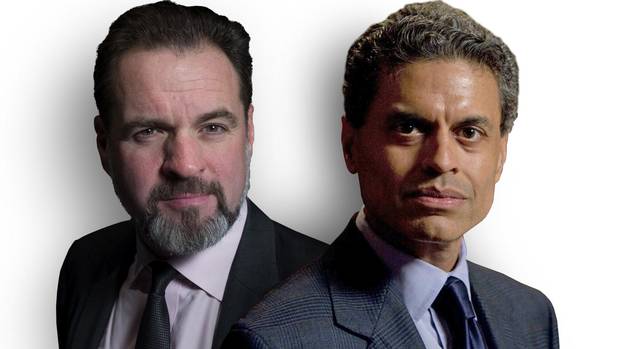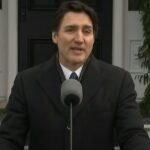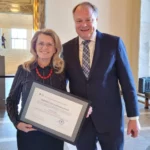By Jonathon Van Maren
Last night’s Munk Debate in Toronto was on a resolution that has been on everyone’s lips for the past year or so: “The Future of Geopolitics: Be it resolved that the Liberal International Order is over.” Arguing for the resolution was the prestigious Oxford-educated historian and author of such books as Civilization: The West and the Rest and The Great Degeneration Niall Ferguson, and arguing against the motion was best-selling author and Yale-educated CNN commentator Fareed Zakaria.
Ferguson was fighting an uphill battle from the beginning—64% of the audience was on Zakaria’s side from the outset, and by the end of the debate he’d lost an additional 5% of the crowd. From a debate perspective, there were a number of reasons for this. Zakaria was at his eloquent best, and he was defending something that nearly the entire audience desperately hopes is true: That the Liberal International Order, with its mighty globalizing institutions such as the United Nations, the European Union, and free trade, are solid–and that Brexit, the rise of Donald Trump, and the surging popularity of populist leaders such as Marine Le Pen in France are simply an aberration or a hiccup. Ferguson, for his part, personalized his attacks far too much, undermining his credibility.
It’s difficult to predict the future and analyze whether the currents of discontent running through nearly every nation in the West are powerful enough to topple the Liberal International Order, but there were a few moments during the debate where Zakaria’s optimism seemed to cross the line into wishful thinking. He gained cheap applause by stating that Canada has dodged the populist bullet by dealing in a sensible way with immigration, following that up with the statement that it reminded him that “all around the world, we should all be a bit more Canadian.” While this is very in line with Justin Trudeau’s announcements that Canada is the “first post-national state” with “no core identity,” this simply brings up more problems that it solves.
The very root of Canada’s perpetual inferiority complex is that Canadians are not quite sure what being a Canadian really means to begin with, a logical problem to have in a multicultural society. But Canada is also beginning to experience rumblings that may turn into populist uprisings if they are not promptly addressed. Sky-rocketing hydro prices in Ontario, for example, are bankrupting businesses and forcing ordinary people to work several jobs just to pay the bills—and while Trudeau’s televised hugs with commoners sobbing about their financial predicaments may make for good press, these problems still need to be solved before the brief emotional catharsis turns ugly. Trudeau himself may recognize this, as Ferguson pointed out in response to Zakaria—he warned that populism was the result of ignoring middle class voices to a banquet hall full of dignitaries in Germany back in February.
But there are simple facts that remain that politicians are hard-pressed to solve, even here in Canada. In Toronto and Vancouver, young men and women born in Canada are being forced to give up the idea of ever owning their own house or property, mainly due to real estate markets that have exploded due to foreign buyers. Even measures introduced to cool the markets seem unlikely to bring housing costs down to a level that allows anyone on an average, middle-class salary to purchase home—especially if they want to live in a city. Complaints about foreign buyers are often berated and suppressed as “racist,” especially in our Liberal International Order, which demands that we see immigration as an exclusively positive thing. The suppression of legitimate concerns with the mechanisms of political correctness just ensure that the backlash will be political.
The other problem with Fareed Zakaria’s analysis of the current geopolitical situation is that in his view—as Ferguson pointed out—“everything is awesome.” And in many ways, that’s hard to argue with. We are all the beneficiaries—especially Europeans—of a Western world that has not seen the types of conflicts that bloodily flattened entire nations in the world wars of the twentieth century. But an accurate geo-political analysis that coldly dismisses the concerns of ordinary people who feel disenfranchised, stripped of their cultural identity, financially strapped, and quite frankly, left behind if not victimized by globalization sounds to those struggling with these things as if they are being told that because their struggles are not the struggles of their forebears, they should be ashamed of their ingratitude towards the wealthy Eurocrats and rootless cosmopolitans who know nothing of their struggles.
Niall Ferguson is still clearly working through these things, but the crux of his argument is that these struggling and disenfranchised people are sending a message that the elites are simply viewing as routine growing pains in our journey to Utopia—or as Zakaria put it, quoting Martin Luther King: “The arc of the moral universe is long, but it bends towards justice.” So what about all the people that see the arc bending away from them?
The frustrating thing about debating such a multi-faceted topic with such a narrow proposition is that neither of the debaters had the opportunity to unpack some of the trends that are underlying the discontent across the Western world, which is why the moderator had to persistently attempt to bring the debate back to the question at hand. Zakaria rightly pointed out that if only young people could vote, Brexit wouldn’t have happened. Demography is destiny, the moderator rejoined.
Which reminded me of Mark Steyn’s thesis in America Alone, one that wasn’t touched on by either debater: that if demographics are in fact destiny, white Europeans don’t have much of a destiny left. There are almost no European countries that are reproducing at population replacement levels, prompting nations like Italy to add lessons on reproduction to their sex education. Europeans, it must be remembered, were not simply faced with massive influxes of Muslim immigrants when the Syrian Civil War triggered a massive migration. It started far earlier, when most European countries decided to stop reproducing and immigrants—with entirely different cultures—were welcomed in to make up the missing work force. If European cultures die, it is not because of Syrian migrants, as some populist politicians like to claim. It is death by suicide.
Zakaria and Ferguson both touched on the topic, but didn’t explore it. Zakaria referred to cultural anxiety without really explaining what cultural anxiety is. Ferguson referred to an uptick in terrorism across the West without unpacking why that was occurring. Zakaria noted that many nations with healthy economies were still experiencing this cultural anxiety, and referred to immigration as a potential cause. But neither of them really explored the clash of cultures between post-modern Europeans—many of whom have given up their unique cultural identities—and the robust cultures from other parts of the world who do not possess any of the same timidities in asserting their cultural values. How does a secular society confront immigrants who are not nearly as eager to secularize as post-Christian Europeans were after the Second World War?
Which brings me to the final question that was not addressed at all. Ferguson appealed to the sovereignty of nation states as a potential solution to a crumbling Liberal International Order, which does not seem to solve the cultural identity crisis that the West is currently experiencing. Zakaria appealed to “enlightened self-interest” as the reason it would survive, although that hasn’t held the barbarians back in the past—it depends on the rest of the population sharing your view of what enlightened self-interest constitutes. Fundamentally, Europe created a spiritual vacuum when it abandoned Christianity. Combined with plunging birth rates, that has raised the influx of immigrants into not simply a question of culture, but of identity on a fundamental level that has left many struggling with a “cultural anxiety,” as Zakaria puts it, that cannot be solved by free trade or financial incentives. Affluence is not a replacement for belonging.
When the welfare state fails, and when declining populations result in an influx of those from other—even antithetical—cultures, fundamental questions start to be asked. Who are we? What do we believe? What sort of nation do we want to have? And in absence of Christianity, the age-old answers that Zakaria is positive are a matter of history begin to surface: Those of blood and soil. Ethno-nationalism. Them versus us. Without values or principles—and secularism vaunts moral relativism and cheap tolerance as a replacement to those—we are left with dangerous rallying points to unite us. When cultures where tribalism runs strong arrive in nations without an identity, they either take over—or they force a competing tribalism to form. That cannot end well—unless the post-Christian West is the pre-Christian West, and returns to the values that founded the West to begin with.









I only stumbled on this Munk debate via YouTube yesterday. I really enjoyed your analysis of the debate and I agree with much of what you’ve concluded. Thank you!